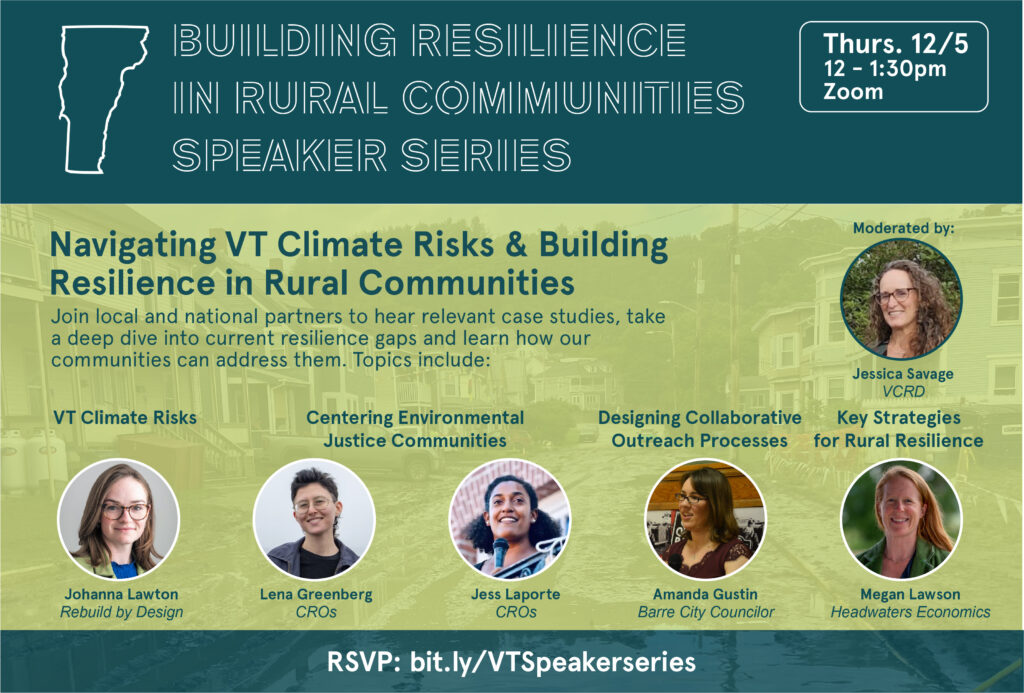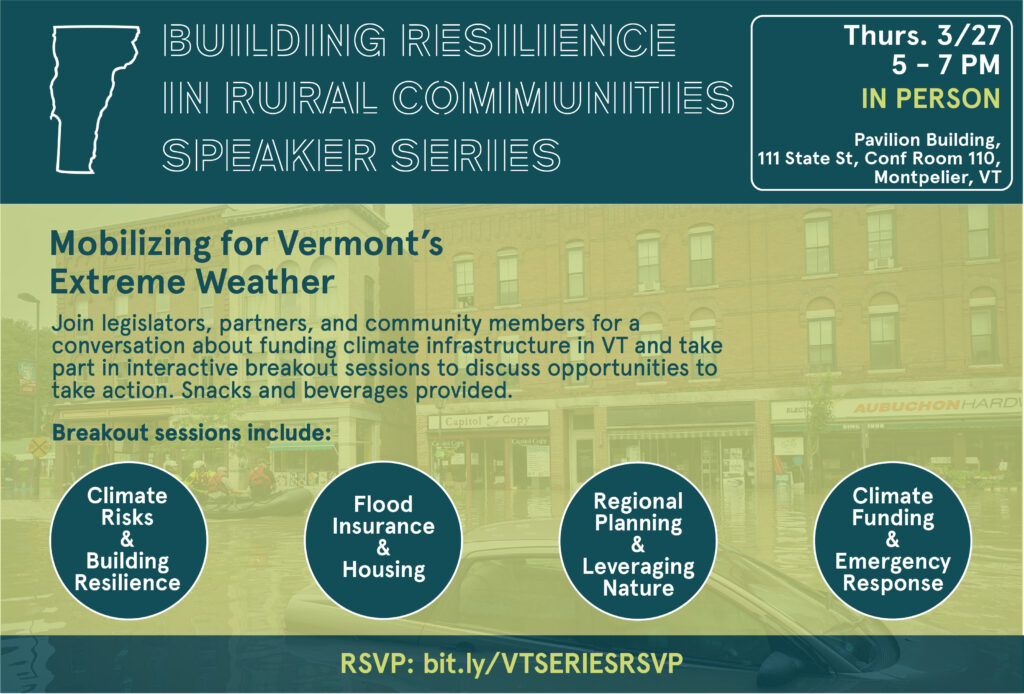Atlas of DISASTER: Vermont (2011-2024)
Major disasters are occurring at an alarming rate and Vermonters are calling for action. In response to the extreme weather events Vermont faced in 2023, Rebuild by Design released the “Atlas of Disaster: Vermont,” highlighting 25 federally declared disasters and advocating for long-term infrastructure funding.
Rebuild by Design’s Atlas of Accountability maps federal major disaster declarations and federal post-disaster assistance obligations for every county in the United States, with an overlay of congressional district boundaries. This tool builds on our 2022 Atlas of Disaster report with updated data and analysis.
Rebuild by Design is working with local Vermont organizations to co-host a virtual multi-part educational series targeted at educating current and incoming legislators, and building local capacity and knowledge to equitably adapt to extreme weather events in Vermont. Panels will feature local leaders, national experts, and legislators to educate, respond to the questions we have heard, and give opportunities to local organizations to showcase their work.
Vermont’s Key Findings:
- Experienced 25 federally declared major disasters due to extreme weather between 2011-2024.
- Ranked 4th in the country for per capita post-disaster federal assistance.
- Ranked 7th in the country for number of recent disaster occurrences.
- Every county has had 5 or more recent major disasters, and 8 counties have had at least 11.
- Washington County has had the highest number of disaster declarations in the state: 22 disasters.
vermont NEEDS FUNDING TO SUPPORT CLIMATE-FORWARD INFRASTRUCTURE:
To ensure a livable future, it is crucial that the State of Vermont secures sustainable, long-term funding for climate adaptation infrastructure. Residents of Vermont are already demanding proactive, comprehensive climate adaptation strategies that would ensure that increases in the frequency of severe weather will not lead to increases in destruction.
Though the State and many municipalities have planning efforts underway to develop new infrastructure to address these issues, there are not yet solid funding sources. A dedicated state-level funding source could support infrastructure for the most physically and socially vulnerable communities throughout Vermont, and reduce risk from extreme heavy rain, and flooding.
#1 We Can Develop a Statewide Ballot Measure
Voters around the country have overwhelmingly supported funding infrastructure measures that address resilience and other climate-related investments. A campaign to pass a Resilient Infrastructure Bond would create a public conversation with voters about prioritizing flood infrastructure while galvanizing the support needed to justify this type of infrastructure spending.
#2 We Can Leverage a Modest Surcharge on Certain Types of Insurance
Rebuild by Design modeled a modest 2% surcharge on certain lines of property and casualty insurance — excluding workers’ compensation and medical malpractice — and found that, in Vermont, the surcharge could support $600 million in climate infrastructure investments over 10 years.
BUILDING RESILIENCE IN RURAL COMMUNITIES SERIES
Rebuild by Design has been working with local Vermont organizations: VPIRG, VNRC, and VCRD to co-host a multi-part educational series targeted at educating current and incoming legislators, and building local capacity and knowledge to equitably adapt to extreme weather events in Vermont.
The first three panels featured local leaders, national experts, and legislators to educate, respond to the questions we have heard, and give opportunities to local organizations to showcase their work. The fourth event, “Mobilizing for Vermont’s Extreme Weather” culminated the learnings from the previous learnings from previous panels into an in-person event that brought together community members, local leaders, and legislators to discuss actionable strategies for Vermont’s extreme weather.
PAST virtual EVENTS

Session #1: Navigating VT Climate Risks & Building Resilience in Rural Communities
This is was first panel of the Building Resilience in Rural Communities Speaker Series. Topics include:
- Vermont’s Climate Risks – Johanna Lawton, Rebuild by Design
- Centering Environmental Justice Communities – Lena Greenberg and Jess Laporte, Community Resilience Organizations (CROs)
- Designing Collaborative Outreach Processes with Communities – Amanda Gustin, Barre City Councilor
- Key Strategies for Rural Resilience – Megan Lawson, Headwaters Economics
- Moderator – Jessica Savage, VCRD
You can find the recording here>>

Session #2: Flood Insurance and Housing
This was second panel of the Building Resilience in Rural Communities Speaker Series. Topics include:
- National Flood Insurance Program (NFIP) 101 – Rebecca Pfieffer, VT DEC Watershed Management Division
- Housing Affordability & Home Protections – Kelly Hamshaw, University of Vermont
- Best Practices for Housing Buyouts – Anna Weber, Natural Resources Defense Council (NRDC)
- Moderator – Jacob Hemmerick, VT Department of Housing & Community Development
You can find the recording here>>

Session #3: Regional Planning and Leveraging Nature as Climate Infrastructure
This was the third panel of the Building Resilience in Rural Communities Speaker Series. Topics include:
This is the third panel of the Building Resilience in Rural Communities Speaker Series. Join local and national partners to hear relevant case studies, take a deep dive into current resiliences gaps and learn how our communities can address them. Topics include:
- Managing Upstream Flooding and Highlighting Regional Planning Efforts – Kevin Geiger, TRORC
- Supporting State-level Flood Resilience Strategies in the U.S. – Gian Tavares, American Flood Coalition
- Leveraging Nature as Climate Infrastructure in VT– Michele Braun, Friends of the Winooski River
- Leveraging Nature as Climate Infrastructure Nationally – Vincent Lee, Arup
You can find the recording here>>

Session #4 Mobilizing for Vermont's Extreme Weather
This was the fourth event of our multi-part Building Resilience in Rural Communities Speaker Series, culminating the learnings from our previous educational panels and transform those learnings into action.
Highlights included:
- 60 community members, local leaders, and legislators engaged in conversation on Vermont’s extreme weather risks and funding climate infrastructure.
- Opening remarks by Treasurer Mike Pieciak highlighting Vermont’s risks and the need for funding climate infrastructure.
- A presentation on “Funding Climate Infrastructure Opportunities”
- Four interactive break out groups to discuss challenges, opportunities, and strategies for: 1) Climate Risks & Building Resilience, 2) Flood Insurance & Housing, 3) Regional Planning & Leveraging Nature and 4 Climate Funding & Emergency Response
You can find the presentation here >>
You can find the Event Key Takeaways & Breakout Group Notes here >>


